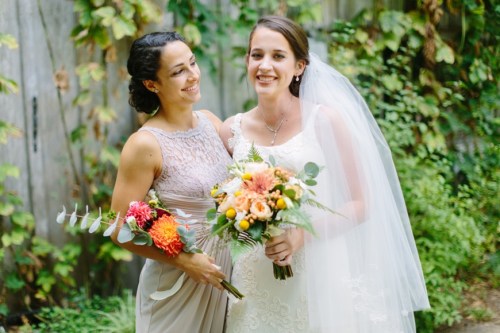In the 2011 comedy Bridesmaids, the decades-long friendship between maid of honor Annie (Kristen Wiig) and bride-to-be Lillian (Maya Rudolph) is put to the test when everything that can go wrong leading up to Lil’s big day does. (If you need a refresher, we’re talking money stuff, squad jealousy, and a disastrous visit to the wedding dress boutique.)
The reason this film is so universally loved—and widely quoted—is because this sort of thing doesn’t just happen on the big screen. When wedding bells start ringing, best friends IRL often experience a tremendous strain on their relationship. High costs, higher expectations, and the highest of emotions (for both the person walking down the aisle and the one holding her train) can threaten even the strongest of bonds.
But even with all the stressors of a wedding, BFFs can keep that cherished title long after the vows are exchanged and the bouquet thrown—as long as they keep cool heads. I asked some experts how, exactly, to do that.
Keep reading for tips on how to maintain equality and sanity during wedding season.

Keep the lines of communication open
“The most important thing is communication from the very beginning,” says Jocelyn Charnas, PhD (AKA “The Wedding Doctor”). That means, as soon as you get engaged and decide you want to ask your friend to be in the bridal party (or, if you’re the one being asked), it’s crucial to have some serious one-on-one chats.
“Conversations have to take place early and often about what expectations are in the arrangement between a bride and a bridesmaid,” Dr. Charnas says.
Remember to still hang as friends (not just bride and bridesmaid)
In the midst of a year of planning and partying, the bond you both share can often be placed on the back burner. “It’s not uncommon for friends to feel as though they don’t have enough time to spend with each other or that they miss the days when their conversations were not dominated by wedding updates,” says friendship researcher and therapist Miriam Kirmayer.
Dr. Charnas recommends a bride and bridesmaid pick some nights to go out for coffee or cocktails—and save the wedding talk for another time. And make it for just the two of you: You’ll be doing plenty with your group in the coming weeks and months.

If you’re the bride, remember your bestie has a life, too
In the midst of dealing with future-in-laws, caterers, and photographers, a bride can lose sight of what’s on the periphery. Yes, you have a wedding to plan, but your bestie likely has a lot on her plate, too. Maybe she’s stressed at work or things aren’t going great in her dating life. “Show your friends that they matter and that your friendship exists outside of the chaos that can surround wedding planning,” Kirmayer says. “Communicate that you value your relationship. Initiate plans and check-ins, even when you are too busy to see each other.”
And bear in mind: When the romantic life of one friend changes significantly, the way you used to spend time may change, too. Feelings of anger or envy can present themselves, Kirmayer says. And when a bridesmaid wishes she was in a committed relationship, too, that can lead to emotional distance between the two parties. “A wedding has an amazing, uncanny ability to bring out any issue that’s going on in life and magnify it,” Dr. Charnas says. But if you treat each other with compassion and respect—and give your friendship some TLC—you should be able to head-off any explosive moments.
For both parties: Practice self-care
It’s also super important that both bride and bridesmaid keep up with their daily routines and rituals to maintain health and happiness. “Focus on getting enough sleep, get moving outside, and make sure you are hydrated and nourished,” says therapist and author Joyce Marter.

Address problems head-on—before they spin out of control
But even if you stick by these guidelines, some issues will likely still arise. Marter says that no matter what the problem is, you should address it face to face: Texts and emails can be misunderstood or misinterpreted.
Marter also recommends using “I” instead of “You” in these heated conversations. “Say, ‘I feel uncomfortable in a backless dress’ instead of, ‘You selected that dress without even considering my feelings,'” she says.
And whatever the issue, try not to let the problems build up. “Acknowledge the tension and normalize the experience,” Marter says. After all, a wedding is supposed to be all about love and respect—and not just between those tying the knot.
PSA: Did you know spending time in the company of friends is actually good for your health? And if you want to really show your BFF how much you love her, here are the best Netflix shows to binge with your bestie.
Sign Up for Our Daily Newsletter
Get all the latest in wellness, trends, food, fitness, beauty, and more delivered right to your inbox.
Got it, you've been added to our email list.











